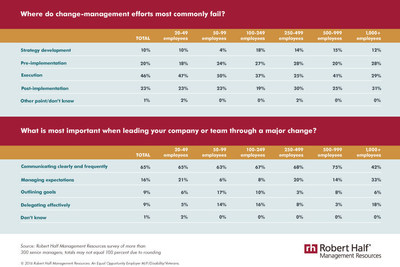Press Releases
Read about our latest research, including results from our ongoing surveys of senior managers and workers, and company announcements.
MENLO PARK, Calif., Feb. 3, 2016 -- As companies initiate change, the path to success is filled with potential potholes. But where are businesses most commonly tripped up during a transition? According to 46 percent of senior managers interviewed for a Robert Half Management Resources survey, change-management efforts typically falter at the execution stage.
The research shows this often depends on the size of the company, however. While roughly half of managers at small companies (those with 20-49 and 50-99 employees) expressed the greatest concern about the execution phase, respondents at the largest companies (1,000 or more employees) said they experience problems most commonly after the implementation.
The survey findings further suggest clear and frequent communication can be the remedy for what ails change-management efforts. Sixty-five percent of managers said this is the most important aspect of leading a team through a transition. It was the top response for companies of all sizes and far outdistanced the second-leading factor, managing expectations (16 percent).
View the data tables with the survey results by company size.
Senior managers were asked, "In general, at which point in the following stages do organizations' change-management efforts most commonly fail?" Their responses:
|
Strategy development |
10% |
|
Pre-implementation |
20% |
|
Execution |
46% |
|
Post-implementation |
23% |
|
At some other point |
1% |
|
100% |
Respondents also were asked, "In your opinion, which of the following do you think is most important when leading your company or team through a major change?" Their responses:
|
Communicating clearly and frequently |
65% |
|
Managing expectations |
16% |
|
Outlining goals |
9% |
|
Delegating effectively |
9% |
|
Don't know |
1% |
|
100% |
"Whether major or incremental, many companies are initiating changes, from transforming their business models to updating business systems and looking for ways to enhance productivity," said Tim Hird, executive director of Robert Half Management Resources. "While change is never easy for a company, it's even harder for employees."
Hird added, "People naturally worry what a transition will mean for them. To prevent rumors, resentment and stress, managers must quickly and continuously update staff, not just on the nuts and bolts of the change but also on how team members will be expected to contribute and, ultimately, benefit from it."
Robert Half Management Resources also highlighted change-management do's and don'ts:
|
Do |
Don't |
|
Communicate early |
Leave employees out of the loop and let rumors spread |
|
Consider the volume of communication |
Share limited information or, conversely, overwhelm people with irrelevant details |
|
Manage expectations |
Sugarcoat issues or set unrealistic goals and timelines |
|
Bring in project professionals for specific expertise and to reduce the burden on staff |
Overload staff, expecting them to help with the transition in addition to maintaining peak performance with their core responsibilities |
|
Communicate the benefits for your team |
Forget the success of your business -- and every initiative supporting it -- is dependent on your employees |
|
Recognize the implementation is only the start; the new process is the beginning of your company's future and requires ongoing communication and training for employees |
Stop communicating after the change is implemented |
|
Celebrate success and reward those involved |
Fail to acknowledge staff contributions |
About the Survey
The survey was developed by Robert Half Management Resources and conducted by an independent research firm. It is based on telephone interviews with more than 300 senior managers at companies with 20 or more employees in the United States.
About Robert Half Management Resources
Robert Half Management Resources is the premier provider of senior-level finance, accounting and business systems professionals to supplement companies' project and interim staffing needs. The company has 150 locations worldwide and offers assistance to business leaders and consultants at roberthalfmr.com and on its blog at blog.roberthalfmr.com.
SOURCE Robert Half Management Resources
